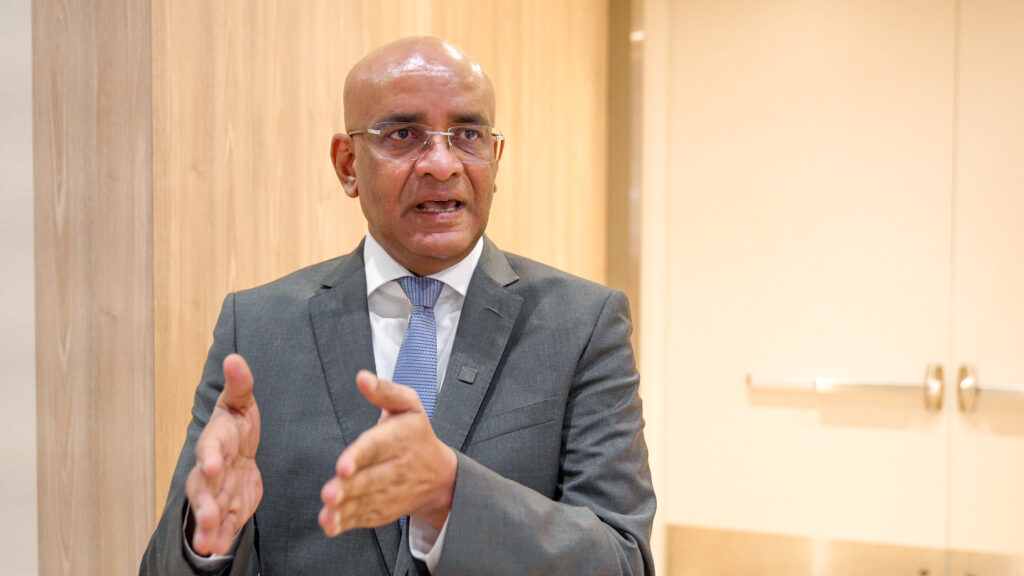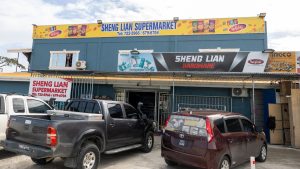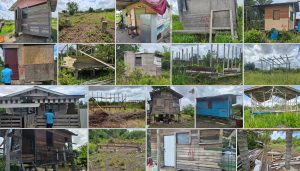Jagdeo: ‘We’d defend our country by any means whatsoever’ if Venezuela ignores World Court ruling

By Neil Marks in Dubai
Guyana will defend itself “by any means whatsoever” if Venezuela ignores the ruling of the World Court and tries to seize control of the Essequibo region, Vice President Dr Bharrat Jagdeo said Saturday, noting that the government is pursuing defense cooperation with several foreign powers.
“If they act in contravention of the ruling of the Court and have aggressive intent on our country, all options are on the table for the defense of our country,” Dr Jagdeo told the News Room.
On Friday, the World Court ruled that the Essequibo region, rich in gold, diamonds and oil reserves off its coast, has been governed by Guyana for the past 124 years and Venezuela “shall” refrain from any action that would “modify” or change this.
“…we are exploring defense cooperation with several countries.
“And we’re not a belligerent country, but if any country, and particularly Venezuela, thinks they can alter the boundary established by the 1899 tribunal, unilaterally, then we’d defend our country by any means whatsoever,” Dr Jagdeo declared.
In Dubai for the United Nations climate summit, Dr Jagdeo hailed the ruling of the International Court of Justice (ICJ) as “a great victory” for Guyana.
Following the ruling, the international community swiftly issued statements calling for the court’s ruling to be respected.

The Court noted that Guyana exercised this sovereign right over the Essequibo based on an arbitration award in 1899 when Guyana was under British control.
The Court pointed out in its unanimous ruling that between November 1900 and June 1904, British and Venezuelan commissioners demarcated the boundary established by the 1899 Award.
“On 10 January 1905, after the boundary had been demarcated, the British and Venezuelan commissioners produced an official boundary map and signed an agreement accepting, inter alia, that the coordinates of the points listed were correct,” Joan Donoghue, president of the Court, stated.
Luis Almagro, who heads the OAS – a powerful group of countries that includes the United States and Canada – said the Court’s ruling is “fundamental in requesting Venezuela to refrain from all provocative, warmongering and illegal actions that encroach on the established boundaries of Guyana’s territory.”
“The Court’s decision is binding and must be respected by the Venezuelan regime,” Almagro declared.

After respecting the boundary for decades, Venezuela in 1962 rejected the 1899 award and a process was set in motion to resolve it’s claim. Talks between the countries over several decades failed to arrive at a solution and the United Nations Secretary General referred the matter to the World Court.
Guyana filed its case and it is still before the Court. But Venezuela set a referendum for Sunday that Guyana feared would lead Venezuela to annex the Essequibo region and to grant Venezuelan citizenship to its inhabitants, causing irreparable harm to Guyana’s rights. And that’s why Guyana moved to the Court for “provisional measures” or protection before the Court issues a final judgement.
The Court agreed with Guyana and ruled this way: “Pending a final decision in the case, the Bolivarian Republic of Venezuela shall refrain from taking any action which would modify the situation that currently prevails in the territory in dispute, whereby the Co-operative Republic of Guyana administers and exercises control over that area.”
Venezuela plans to press ahead with its referendum on Sunday, but Dr Jagdeo said Guyana is not bothered about that, seeing it as an “internal matter” and part of the playbook of the Venezuelan leadership to bolster its chances at next year’s elections there.
For Jagdeo, what’s important is that Venezuela cannot use the referendum as an license to invade Essequibo.
“…the operative part of the ruling explicitly – the unanimous ruling of the ICJ – is that they have to recognise the existing borders and they cannot take any action to alter those borders,” Dr Jagdeo told the News Room.
He pointed out that Guyana has robustly pursued the legal route on the controversy and has so far won. He said too, Guyana’s has pursued the diplomatic route and has received “overwhelming” support from the international community.
And now, he said the country is seeking defense cooperation with its allies.
“The court made a very important ruling – that Venezuela has to refrain from taking any action that will affect the territory given to Guyana by virtue of the 1899 award – that is all we wanted.
“We were fearful that they would have utilized the referendum to then justify aggressive actions against Guyana, possibly invade our territory.
“The court has made it clear they cannot do that. So, this is a great ruling for Guyana, we’re extremely pleased with it,” Jagdeo stated.
Venezuela has vowed not to accept the ruling of the Court and in fact, one of the questions in its referendum Sunday is to seek a rejection of the Court in handling the case.
But Dr Jagdeo says, the choice is up to Venezuela, but he says the international community is on Guyana’s side.
“…whether they accept it or not, the international community is what matters.
“And no country in the world would recognise any border other than the border that we currently have – or after the (substantive ) ruling of the ICJ – the border defined by that court.”










